(In which series I intend to watch every Planet of The Apes movie ever made, beginning with the original classic, Planet of The Apes, and continuing through summer 2014′s newest entry in ape-lore, Dawn of The Planet of The Apes. Join me, and we will lose our pitiful human minds together.)
When 20th Century Fox went about re-booting the Planet of The Apes series the first time, in ’01, it was the result of thirteen years of conflicting scripts, story ideas, writers, directors, and executives. Nobody was particularly inspired to make a particular movie, it just seemed like the Apes concept was ripe for revisiting, preferably in some sort of inoffensive, easily marketable way. For years no one could agree on what such a movie would look like, until they agreed it wouldn’t look like anything. The result was a joke.
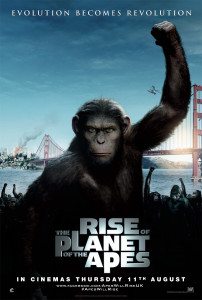 Ten years later came Rise of The Planet of The Apes (’11), a movie with a very different history. Screenwriters Rick Jaffa and Amanda Silver, disgusted by the real-world mistreatment of apes, and inspired to write about it, realized their story would work as a kind of Planet of The Apes origin story. They wrote what they wanted to write, and Fox bought it.
Ten years later came Rise of The Planet of The Apes (’11), a movie with a very different history. Screenwriters Rick Jaffa and Amanda Silver, disgusted by the real-world mistreatment of apes, and inspired to write about it, realized their story would work as a kind of Planet of The Apes origin story. They wrote what they wanted to write, and Fox bought it.
Directed by Rupert Wyatt, Rise of The Planet of The Apes is the best Apes movie since Beneath, if not the original. It does what I wish so many other summer movies would do: tell a straightforward story in a brisk 90 minutes centered on a character you care about.
In this case the character is a chimp, Caesar (the name of Zira and Cornelius’s son in the original series), played by Andy Serkis, no stranger to motion-capture or great apes, having played both Gollum and King Kong. It’s Caesar’s story, and that’s what I like best about Rise. One’s sympathies are with the chimps. Even scientist William Rodman (James Franco), playing the sympathetic human in the story, the one who raises Caesar rather than see him “put down” with the other lab chimps, is blind to his mistreatment of chimps in general and Caesar in particular.
The story begins with Rodman thinking he’s perfected a viral drug intended to repair damaged brain cells, in effect a cure for Alzheimer’s, from which his father, Charles (John Lithgow), suffers. Rodman tests the drug successfully on a chimp named Bright Eyes (which was Zira’s name for Taylor in the original), but when she’s dragged from her cage, away from her baby, she goes on a rampage.
She’s shot to death during Rodman’s presentation to the board, on the table in front of everyone, after crashing through the wall of high-tech monitors. The board members are not amused.
Whatever benefits to Bright Eyes’s brain the drug caused have been passed on to her baby, Caesar, whom Rodman brings home and raises. Rodman, devastated by his father’s deterioration, and frustrated at his company’s refusal to believe that his drug is effective, steals the drug from his lab and injects Charles with it. Lo and behold, Charles recovers completely.
So Rodman is indifferent to chimps as test subjects, and he’s got no problem using his father as the first human subject for a new drug. One begins to question how sympathetic we’re supposed to find this guy.
Years pass. Rodman brings Caeser to the zoo where a vet, Caroline (Frieda Pinto), stitches up an injury. She tells Rodman that when Caesar grows older, he can’t be kept as a pet. Good advice. Five years later, she and Rodman are a couple, and Caesar is still with them.
Are all of these humans bastards? They regularly take Caesar to climb the redwoods in Muir Woods. On one trip he sees a dog on a leash and makes the connection: he’s not an individual, he’s a pet.
After an incident in which Caesar beats the hell out of a neighbor, he’s brought to a facility that looks after apes saved from labs and circuses. It’s run by a shameless bastard, Landon (Brian Cox), and his sadistic bastard of a son, Dodge (Tom Felton).
Rodman promises Caesar he’ll be back, but he’s got his own problems: Charles has relapsed. Rodman begins testing chimps with a new, stronger version of his viral drug, which his lab assistant, Robert, is accidentally dosed with.
Caesar becomes hardened in ape prison. When eventually Rodman tries to take him home, Caesar refuses to come. He’s already taken charge of the apes. He’s got a plan. Which is to use Rodman’s latest formula to boost the brains of the other apes and escape.
No one in the movie is theatrically judgmental, another one of its strengths. Nobody gives any big speeches about who’s done what wrong. Rodman, all told, is a monster. He single-handedly gives chimps super-intelligence and, through his assistant being dosed, unleashes a plague. Yet there’s no scene where he has to own up to this or even, really, to face it in any way whatsoever. He has one final scene in the redwoods with Caesar, asking him to stop, to come home. But Caesar’s already home.
Rodman acts like the good guy throughout, but his ignorant hubris sparks the end of the world, at least as far as humans are concerned. It’s an unusually realistic portrayal of the banality of evil, of the good intentions the road to hell is paved with. He’s just a nice guy, it seems, yet look at what he’s wrought. He’s selfish, cruel, and blind.
The movie belongs to Serkis as Caesar. His slow road to understanding the power he weilds over humans is delivered, of course, without dialogue. He observes, learns, and acts.
Eventually Caesar speaks. In a call-back to Heston’s famous line, Dodge, when grabbed by Caesar in a fight, says, “Take your paws off me, you damn dirty ape.” To which Caesar replies, “No.” This is how you make a call-back work. In the original, it’s not just a catchy line, it’s Taylor speaking to the apes for the first time. They’re blown away—a human can talk! It’s used for the same effect, albeit with the species reversed, in Rise. Contrast that to the ’01 remake where the line is shoved in at random with no meaning whatsoever.
Rise is packed with references to the past Apes movies. In one early scene, a young Caesar plays with a toy Statue of Liberty. In a passing shot of a television, we see a rocket launch, a manned mission to Mars, the ship named Icarus, the name of Taylor’s ship in the original (and later a newspaper headline: LOST IN SPACE. Lost in the future, perhaps?). Many characters, both ape and human, are named after characters, actors, or filmmakers from the original series. Which doesn’t make the movie any better, but in case you’re insane, like me, and just watched the first five Apes movies, the many references provide an added level of amusement.
When I first saw Rise, in ’11, I liked it but found a lot of it dumb. This time around, I liked it much more. The humans are dumb, but that’s the point. They’re not the focus. They’re not important. They’re blind to their blindnesses. Abusing, mistreating, and killing apes is simply a part of life, so far as they’re concerned. They might be nice to them when it’s convenient, but when inconvenient? Their own needs come first. Like the earlier Apes movies, Rise is essentially an allegory, and as such any number of peripheral characters exist as nothing more than brushstrokes. It’s no different in the original.
Rise of The Planet of The Apes is a one-ape story, the tale of a revolutionary being born and coming into his own. He fights adversity, throws off his shackles, and with his oppressed brothers and sisters finds freedom. Next up? The revolution. I have high hopes for Dawn of The Planet of The Apes. Foolish, perhaps, but a guy can dream, can’t he?
The Going Ape series:

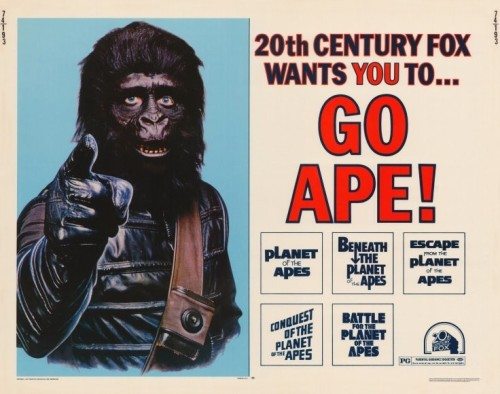
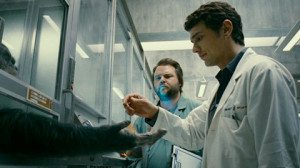
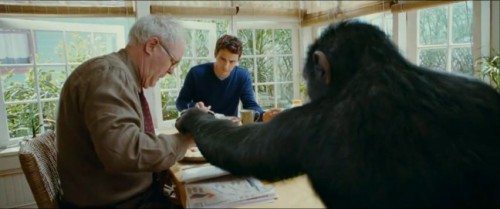

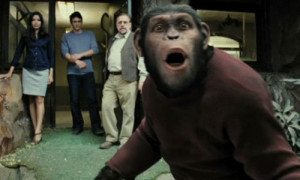
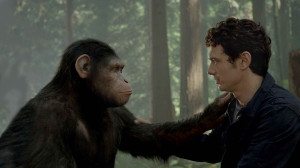


Just watched this again last week, and it does hold up. As I remembered, there’s definitely some dumb stuff in it. I think it’s pretty generous to say the dumb stuff is the humans’ fault and so it adds to us caring less for the humans and more for Caesar. I still think it’s more dumb stuff the screenwriters did. But I guess the effect is pretty much the same.
In any case, the whole movie rests on Caesar’s shoulders, and it’s really a testament to Andy Serkis’s abilities and to the effects crew that it works so well. He’s really so believable and a very strong character.
I think the whole thing really benefits from so much of the story being about apes who can’t speak. It’s just impossible for the thing to get bogged down with shitty dialogue. Good storytelling.
I’m psyched for this next one. But then, I was excited for the last Spider-man too.
Well, not being sure of which dumb stuff you’re referring to, I can’t say for sure, but things like the genetics company being simplistically evil, and the relationship between Franco and the veterinarian being glossed over, and her not actually doing anything at all about putting Caesar someplace appropriate early on—watching it again, all of these elements work if you look at the story less as something ‘real’ than as a parable of humanity’s stupidity. that’s what i was getting at. like the original Apes movies, ‘realism’ is not the guiding principle here.
but anyway, yeah, Serkis is awesome and i’m excited for the new one.
I was a bit less generous in my viewing. http://frontalot.com/index.php/?page=dorknote_detail&id=32
Yes, but only slightly less. I know you have a secret love for all things Franco.
The real trick to viewing Rise, at least in order to receive maximum movie satisfaction from it, is to first watch every other Planet of The Apes movie. Actually, any movie viewed immediately following Burton’s Apes movie will appear as a masterpiece of the cinematic arts.